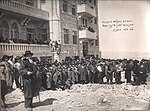Nefesh B'Nefesh
Nefesh B'Nefesh (Hebrew: נפש בנפש, lit. 'Soul to soul'), or Jewish Souls United, a nonprofit organization, promotes, encourages and facilitates aliyah (Jewish immigration to Israel) from the United States, Canada and the United Kingdom. The organization aims to remove or minimize the financial, professional, logistical, and social obstacles that potential olim (Jewish immigrants) face. Nefesh B'Nefesh works in close cooperation with the Jewish Agency for Israel, the Government of Israel and major Jewish organizations across various denominations, and assists people of all ages in the pre- and post-aliyah process, offering resources such as financial aid, employment guidance and networking, assistance navigating the Israeli system, social guidance and counseling. Since 2002 Nefesh B'Nefesh has brought over 60,000 olim to Israel. In 2011 Nefesh B'Nefesh co-founder Yehoshua Fass received the Moskowitz Prize for Zionism on behalf of the organization.
Excerpt from the Wikipedia article Nefesh B'Nefesh (License: CC BY-SA 3.0, Authors).Nefesh B'Nefesh
עם ועולמו, Jerusalem Givat Shaul
Geographical coordinates (GPS) Address Nearby Places Show on map
Geographical coordinates (GPS)
| Latitude | Longitude |
|---|---|
| N 31.789722222222 ° | E 35.186666666667 ° |
Address
עם ועולמו 5
9546105 Jerusalem, Givat Shaul
Jerusalem District, Israel
Open on Google Maps







